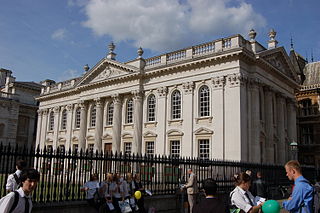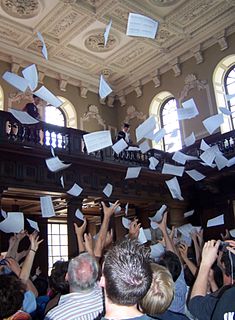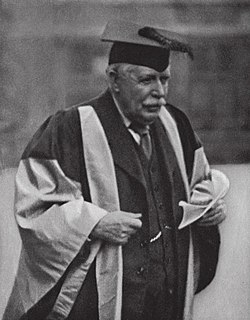Related Research Articles

Classics or classical studies is the study of classical antiquity, and in the Western world traditionally refers to the study of Classical Greek and Roman literature in their original languages of Ancient Greek and Latin, respectively. It may also include Greco-Roman philosophy, history, and archaeology as secondary subjects.

At the University of Cambridge, a Tripos is any of the undergraduate examinations that qualify an undergraduate for a bachelor's degree or the courses taken by an undergraduate to prepare. For example, an undergraduate studying mathematics is said to be reading for the Mathematical Tripos, whilst a student of English literature is reading for the English Tripos.

Benjamin Hall Kennedy was an English scholar and schoolmaster, known for his work in the teaching of the Latin language. He was an active supporter of Newnham College and Girton College as Cambridge University colleges for women.

Girton College is one of the 31 constituent colleges of the University of Cambridge. The college was established in 1869 by Emily Davies and Barbara Bodichon as the first women's college in Cambridge. In 1948, it was granted full college status by the university, marking the official admittance of women to the university. In 1976, it was the first Cambridge women's college to become coeducational.
Khâgne, officially known as classes préparatoires littéraires, is a two-year academic program in the French “post-bac” (≈undergraduate) system, with a specialization in literature and the humanities. It is one of the three main types of Classe préparatoire aux grandes écoles, contrasting with other CPGE majors such as Maths Sup in mathematics and engineering, or Prépa HEC in the business domain.
The Natural Sciences Tripos (NST) is the framework within which most of the science at the University of Cambridge is taught. The tripos includes a wide range of Natural Sciences from physics, astronomy, and geoscience, to chemistry and biology, which are taught alongside the history and philosophy of science. The tripos covers several courses which form the University of Cambridge system of Tripos. It is known for its broad range of study in the first year, in which students cannot study just one discipline, but instead must choose three courses in different areas of the natural sciences and one in mathematics. As is traditional at Cambridge, the degree awarded after Part II is a Bachelor of Arts (BA). A Master of Science degree (MSci) is available to those who take the optional Part III. It was started in the 19th Century.
Literae humaniores, nicknamed greats, is an undergraduate course focused on classics at the University of Oxford and some other universities. The Latin name means literally "more human literature" and was in contrast to the other main field of study when the university began, i.e. res divinae, also known as theology. Lit. hum. is concerned with human learning, and lit. div. with learning treating of God. In its early days, it encompassed mathematics and natural sciences as well. It is an archetypal humanities course.

The Mathematical Tripos is the mathematics course that is taught in the Faculty of Mathematics at the University of Cambridge. It is the oldest Tripos examined at the University.
Honour Moderations are a set of examinations at the University of Oxford at the end of the first part of some degree courses.

Hector Munro Chadwick was an English philologist. Chadwick was the Elrington and Bosworth Professor of Anglo-Saxon and the founder and head of the Department for Anglo-Saxon and Kindred Studies at the University of Cambridge. Chadwick was well known for his encouragement of interdisciplinary research on Celts and Germanic peoples, and for his theories on the Heroic Age in the history of human societies. Chadwick was a tutor of many notable students and the author of numerous influential works in his fields of study. Much of his research and teaching was conducted in cooperation with his wife, former student and fellow Cambridge scholar Nora Kershaw.

Liceo classico is the oldest, public secondary school type in Italy. Its educational curriculum spans over five years, when students are generally about 14 to 19 years of age.

The University of Liverpool Department of Archaeology, Classics and Egyptology has 40 members of staff and over 300 undergraduate and postgraduate students.
Katharine Jex-Blake, was an English classical scholar, and the eighth Mistress of Girton College, Cambridge.
English studies is an academic discipline taught in primary, secondary, and post-secondary education in English-speaking countries; it is not to be confused with English taught as a foreign language, which is a distinct discipline. It involves the study and exploration of texts created in English literature. English studies include: the study of literature, the majority of which comes from Britain, the United States, and Ireland ; English composition, including writing essays, short stories, and poetry; English language arts, including the study of grammar, usage, and style; and English sociolinguistics, including discourse analysis of written and spoken texts in the English language, the history of the English language, English language learning and teaching, and the study of World Englishes. English linguistics is usually treated as a distinct discipline, taught in a department of linguistics.
The University of Auckland Faculty of Arts, is a large faculty providing a range of programmes in over 50 subjects. The faculty is based on the city campus, however the departments are spread all over the campus. The main building, Arts 1, is located on Symonds Street.

The Faculty of Classics is one of the constituent departments of the University of Cambridge. It teaches the Classical Tripos. The Faculty is divided into five caucuses ; literature, ancient philosophy, ancient history, Classical art and archaeology, linguistics, and interdisciplinary studies.

Agnata Frances Butler was a British classical scholar. She was among the first generation of women to take the Classical Tripos examinations at the University of Cambridge, and was the only person to be placed in the top division of the first class at the end of her third year, in 1887. She married the Master of Trinity College, Henry Montagu Butler, in August 1888, becoming the leading hostess in Cambridge. She published a version of Book VII of Herodotus' Histories in 1891.

The Department of Classics is an academic division in the Faculty of Arts and Humanities at King's College London. It is one of the oldest and most distinguished centres for the study of classical languages, literature, thought, religion, art, archaeology and history in the United Kingdom.

The University of Cambridge is a collegiate public research university in Cambridge, England. Founded in 1209 and granted a Royal Charter by King Henry III in 1231, Cambridge is the second-oldest university in the English-speaking world and the world's fourth-oldest surviving university. The history and influence of the University of Cambridge has made it one of the most prestigious universities in the world. Numerous scholarships, prizes, honors, and awards specific to the University are awarded to prospective or current students.
References
- ↑ Smith, Jonathan C. (2002). Teaching and learning in nineteenth-century Cambridge. Ipswich: Boydell Press. pp. 207–208. ISBN 0-85115-783-1.
- ↑ Beard 2017.
- ↑ Dash 2011.